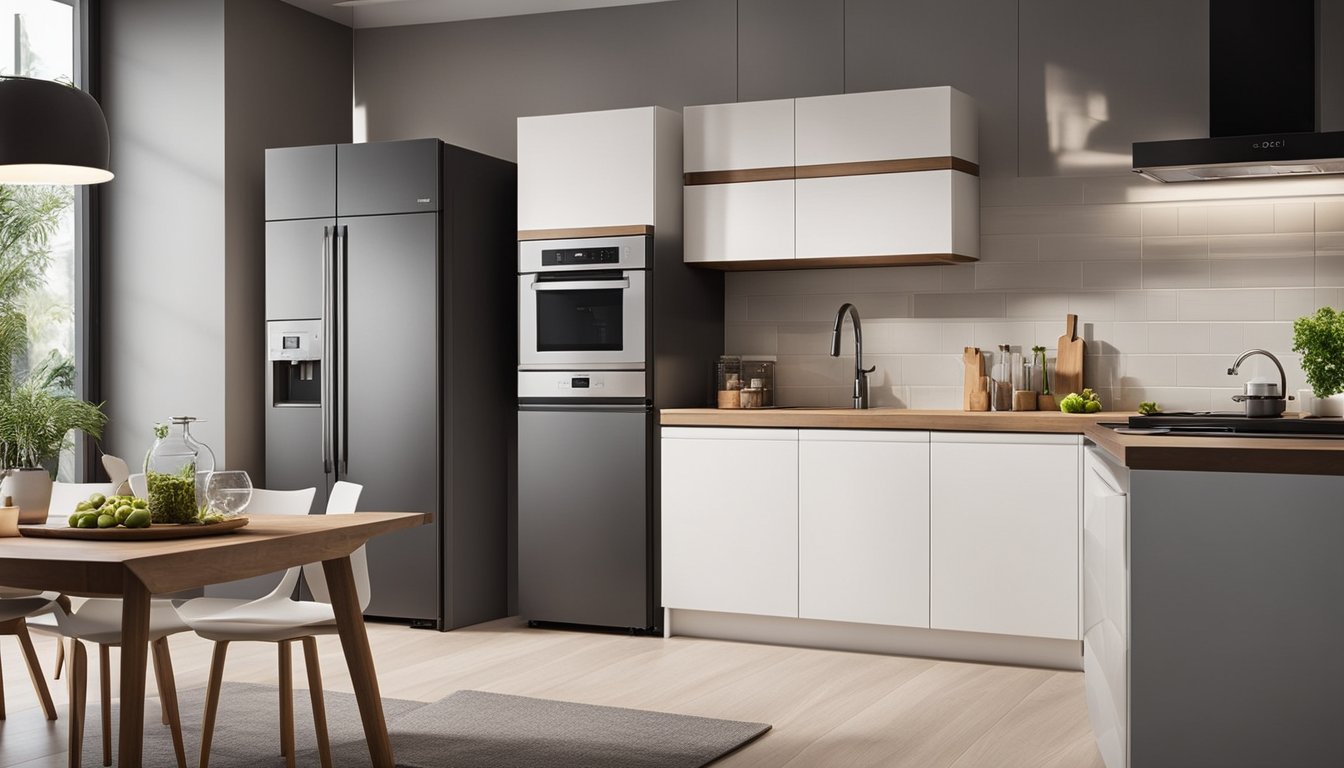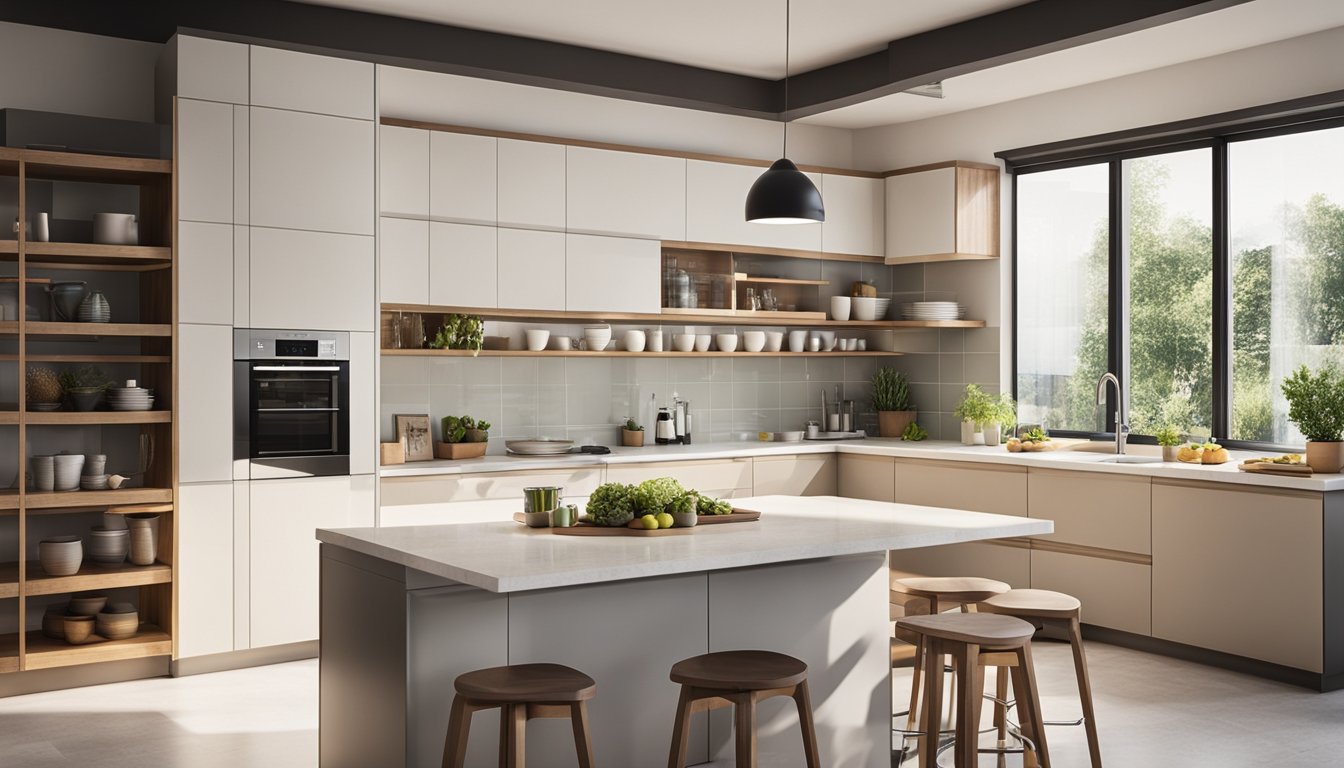Late updated: 25 Jul 2024 14:07
Written by: Eleanor Hartman
Best Energy-Efficient Appliances for UK Homes: A Guide to Sustainable Living
Reducing energy consumption in our homes is more important now than ever, both for our wallets and the environment. In this blog post, we'll highlight the best energy-efficient appliances available for UK homes, providing you with practical options to lower your household energy usage. From dishwashers and fridges to microwaves, choosing the right appliances can make a significant impact on your energy bills and carbon footprint.

First, let's consider dishwashers and fridges, which are essential for any home. Energy-efficient dishwashers not only save electricity but also use less water. Meanwhile, selecting a fridge with a high energy efficiency rating ensures your food stays fresh without driving up your energy costs. Microwaves are another excellent addition, as they consume considerably less energy compared to traditional ovens.
Updating your home with energy-efficient appliances is a smart investment. By lowering your energy consumption, you not only save money but also contribute positively to environmental conservation. With a focus on sustainability, these appliances help reduce the overall carbon footprint of our homes.
Key Takeaways
- Energy-efficient appliances lower both energy bills and carbon footprints.
- Dishwashers, fridges, and microwaves are key appliances to consider.
- Investing in these appliances benefits both your home and the environment.
Exploring Energy Efficiency in Appliances
The focus on energy-efficient appliances has become essential for reducing energy consumption and lowering electricity bills. By choosing devices with top energy ratings and utilising smart technology, we can significantly impact our household's energy use and contribute to a more sustainable environment.
Understanding Energy Ratings and Labels
When selecting an energy-efficient appliance, the energy rating is a key consideration. Appliances are graded from A+++ to G, with A+++ being the most efficient. These ratings help us identify products that consume less electricity, leading to lower energy bills.
Energy labels also provide details about the appliance’s energy consumption, measured in kilowatt-hours (kWh). For instance, an A+++ fridge-freezer will consume considerably less power annually compared to a D-rated one. The Energy Saving Trust recommends always looking for the highest-rated appliances to maximise savings.
The Role of Smart Technology
Smart technology plays a crucial role in enhancing energy efficiency. Smart meters, for example, allow us to monitor real-time energy usage, making it easier to identify high-consumption appliances. By adjusting our habits based on this information, we can reduce our energy bills.
Standby savers and appliances with eco settings automatically reduce energy consumption when not in use. This integration of intelligent systems helps in minimising unnecessary energy waste and optimising overall efficiency. Additionally, many modern appliances communicate with each other, coordinating their operations to maintain energy efficiency.
Impact on Energy Bills and Environment
Investing in energy-efficient appliances leads to significant savings on energy bills. For example, an A-rated washer can save us around 20% more energy compared to standard models, reducing electricity and water usage. This translates to lower annual household costs.
Importantly, energy-efficient appliances contribute to reducing our carbon footprint. Using less electricity and gas diminishes the emission of greenhouse gases, aligning with environmental goals. Organisations such as National Energy Action underscore the importance of such appliances in mitigating climate change.
By choosing energy-efficient appliances and leveraging smart technology, we make a more significant impact on both our finances and the environment. Opting for appliances with high energy ratings not only saves money but also promotes a sustainable future.
Essential Energy-Efficient Appliances for UK Homes

Energy-efficient appliances not only help reduce our household bills but also lower our carbon footprint. Here's a look at the most crucial appliances for an energy-conscious home.
Kitchen Must-Haves
Refrigerators and Freezers: Modern refrigerators with A+++ ratings can dramatically cut energy use. A model we recommend is the fridge-freezer which optimises space and efficiency. Energy-efficient fridges also maintain consistent temperatures, preserving food freshness longer.
Dishwashers: An A+++ dishwasher can save significant water and electricity compared to hand washing. Look for models with eco settings, which use lower temperatures and less water.
Cooking Appliances: Microwaves are brilliant for small meals, using far less energy than traditional ovens. Induction hobs also stand out for their quick heating and energy conservation. Consider ovens with convection features that cook evenly and more rapidly.
Laundry and Cleaning Innovations
Washing Machines: High-efficiency washing machines significantly reduce water and energy use. Models with lower water consumption and faster spin speeds are particularly beneficial, reducing drying time.
Tumble Dryers: Heat pump tumble dryers are far more efficient than traditional vented dryers, recirculating warm air and minimising energy wastage. They’re a smart investment despite a higher upfront cost.
Vacuum Cleaners: The latest vacuum cleaners focus on energy efficiency without sacrificing suction power. Look for appliances with energy labels indicating low energy consumption and high cleaning performance.
Auxiliary Appliances and Devices
Kettles: Energy-efficient kettles boil water faster and with less electricity. Opt for models with precise temperature controls that prevent over-boiling.
Electric Showers: Electric showers offer instant hot water without relying on a full water heating system. They can be more efficient, especially in households where hot water use is sporadic.
TVs and Entertainment Systems: Modern TVs, especially those with LED technology, consume much less electricity. Energy-saving games consoles and broadband routers also help reduce standby power consumption.
Fan Heaters: These devices provide quick, targeted heating. Choose models with thermostatic controls and timers to avoid excessive energy use.
By integrating these energy-efficient appliances, we can make substantial cuts to both our energy bills and environmental impact.
Frequently Asked Questions

Energy efficiency in appliances not only reduces utility bills but also contributes to environmental sustainability. Understanding the criteria, costs, and strategies can help us make better choices.
What criteria determine the energy efficiency of household appliances?
The energy efficiency of household appliances is primarily determined by their energy ratings. In the UK, these ratings range from A+++ to D, with A+++ being the most efficient. These labels consider the average energy consumption of the appliance during standard use.
How do recent changes in energy ratings affect the evaluation of appliances?
Recent revisions in energy ratings have made them more stringent. What was previously rated as A+ might now fall under a lower classification. This shift helps us better identify truly efficient products. For instance, an appliance rated A+++ is significantly more efficient than those rated lower.
What are the implications of owning an appliance with an F energy rating?
Appliances with an F energy rating consume more electricity, leading to higher utility bills. For example, a larger fridge freezer with an F rating may cost more annually to run than a smaller, less efficient model. This could result in long-term savings if replaced with a higher rated appliance.
Which home appliances consume the most energy when not in active use?
Some home appliances, such as ovens, maintain high energy consumption even when not actively used. Ovens are particularly significant, often running several hours daily. Keeping doors shut to trap heat or considering a microwave for small meals can make a difference.
How do the costs of running various electrical appliances in UK homes compare?
Running costs vary widely among appliances. An oven, for example, can significantly impact electricity bills, with costs potentially reaching £47.12 monthly. In contrast, more efficient appliances like certain heat pump tumble dryers use around 0.45 kWh per cycle, costing approximately £0.09 per use.
What are the most effective strategies to decrease electricity usage by appliances in UK homes?
To decrease electricity usage, opt for appliances with higher energy ratings. Use microwaves instead of ovens for small meals. Regular maintenance, such as defrosting freezers and cleaning filters, also ensures they run efficiently. Finally, unplugging devices when not in use reduces standby power consumption.